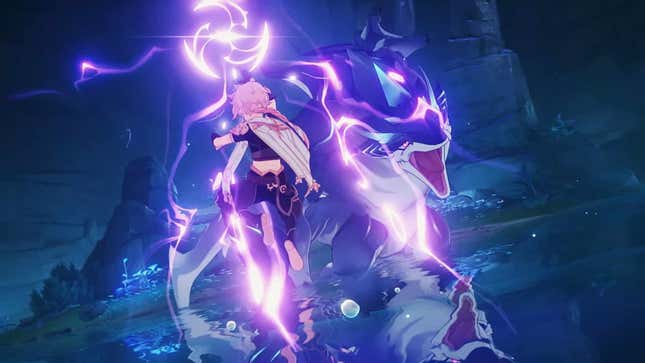
Genshin Impact’s first major update of the year takes place in the Chinese-inspired city-state of Liyue. The update centers two new characters, and Liyue will soon host Genshin’s annual Chinese New Year event. So I understand why the newly added Enkanomiyan islands aren’t depicted as the meat of this update. There’s no festival going on in the abyssal depths of this long-lost civilization, and no beautiful anime wives live there. But it’s a must-play for anyone who cares about the larger narrative of Genshin Impact.
At face value, Enkanomiya is a gorgeous update that allows you to solve new puzzles, collect new lore tidbits, and jam to the most stunning soundtrack additions since the Inazuma region landed. Certainly, I’ve enjoyed hunting for treasure and solving new puzzles. But this place haunts me even when I’m not playing the game. I’ve spent three days playing the new Enkanomiya map, and an entire week analyzing what the hell it all means. Almost every single character in the game is affected by the full implications of Enkanomiya’s secrets.
Here’s a quick recap from the first major quest: Celestia is an island that floats above Teyvat, which is the world of Genshin Impact. According to the wind god Venti, every “Archon” derives a significant amount of their power from their Gnosis, which is tied to Celestia. Vision holders (which includes every playable character) can ascend to the island to become gods themselves. Though Celestia isn’t the only source of magical power in Genshin’s setting, it’s the only way that humans can obtain magic.
Its main enemy faction is the Abyss Order, which is made up of monsters who were once citizens of the lost kingdom of Khaenri’ah, a nation that Celestia destroyed. The story of Enkanomiya is partially told through the perspective of one of their officers. While they are one of the main villain factions in the game, Enkanomiya made me wonder if they were truly fighting against a greater injustice.
Though Enkanomiya is technically part of the Inazuma region’s map, it’s located in a strange dimension that can’t be accessed by normal means. Before it was abandoned by its inhabitants, it was an ancient Greece-inspired civilization that supposedly predates the current gods. At some point, the Enkanomiyan god Orobashi took his people above the abyssal depths, where they assimilated to Japanese culture and became the people of Watatsumi Island. For reasons unknown, Orobashi was slain by the Electro Archon when he tried to invade her territory. The cause was a mystery to in-game historians, since the gods had previously co-existed peacefully with one another.

Well, now we have a plausible reason. After I played through all the main quests in Enkanomiya, our local tour guide revealed that he was an agent of the Abyss Order (which again, are the citizens of a nation that was destroyed by Celestia long ago). According to him, Orobashi accidentally found out that the ruling powers were alien beings from a different world. To protect his people from the consequences of his mistake, he agreed to sacrifice himself by invading the Electro Archon’s territory. But without their own god, the Watatsumi people–whom the playable character Sangomiya Kokomi leads–would be second-class citizens throughout Inazuma’s history.
I was completely bowled over by this revelation because Orobashi wasn’t just some footnote in a historical textbook. His bones can be seen all over Yashiori Island, jutting out of the soil like a corpse that someone haphazardly buried after a murder. Before I suppressed Orobashi’s soul by fixing a priest’s wards during the “Orobashi’s Legacy” questline, Yashiori Island’s neverending storms constantly tried to kill me with lightning bolts. I used to hate that god and his petty grudges. Why couldn’t he just leave me alone while I tried to finish my daily quests? Now, I’m angry that nobody was able to enact justice for this gentle, selfless god.
And that’s one of the reasons why Genshin Impact is such an incredible accomplishment in open-world design. Whenever I collect a new piece of lore about its world, the information completely reshapes how I feel about a particular place that I visit every day. Now whenever I harvest Crystal Marrow from Orabashi’s bones, I think about how he sacrificed himself to protect Kokomi’s people from Celestia’s wrath. RIP Orobashi. You were a real one.
Unlike the portrayal of gods in most western games, Genshin portrays gods as gentle and selfless beings. Playable heroes Venti and Zhongli are some of my favorites, and I use them fairly regularly. Never once did they mention that the gods of Celestia (aka their bosses) were genocidal colonizers who destroyed Khaenri’ah. If anything, they were consistently evasive about Celestia’s secrets. Why wouldn’t they be? Orobashi was murdered for finding the truth, and his people had suffered for his mistake.
Celestia’s tyrannical rule would continue, all because every nation’s leader refused to sacrifice the people they love in order to challenge power. Did looking away from injustice make them strong? Did it mean that they were weak? For once, I didn’t know the answer. But it did become clear to me why all the Archons that I met so far had surrendered their Gnoses so easily: They couldn’t rebel outright, but they didn’t want any more part in Celestia’s regime. Without directly addressing other parts of the lore outright, the Enkanomiya update managed to answer so many questions about key aspects of Genshin Impact’s main plot.
After playing the update, it’s clear to me that Celestia has to be overthrown. It’s just a pity that the main factions that oppose its tyranny, like the Abyss Order, are villains who regularly place civilians into harm’s way. Sure, I get that Celestia is immeasurably powerful and can zap civilizations in an instant, but I’d rather skip the shady abyss magic and aggressive brinkmanship. I don’t disagree with the Abyss’ goals. I just wish that kinder heroes were leading this struggle.